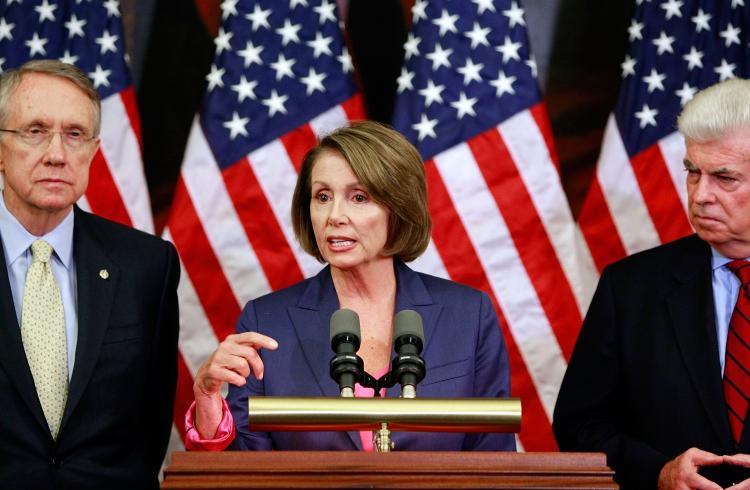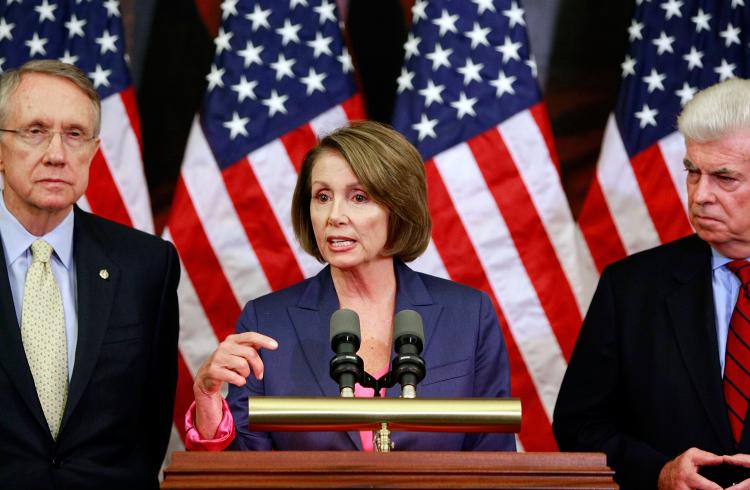On Sunday evening, Congressional lawmakers agreed on a compromise $700 billion federal bailout plan, paving the way for the U.S. government to inherit billions of toxic mortgage-related securities plaguing the financial markets and clogging up liquidity.
The final plan, titled “The Economic Stabilization Act of 2008” contains restrictions on executive compensation and built-in protections for taxpayers. $250 billion would be available immediately after the passage of the bill, and the rest would be paid in increments of $100 billion.
Companies selling assets to the government would issue stock warrants, allowing taxpayers to own equity stakes in companies as they grow and recover. The plan also includes a provision—introduced by House Republicans—that allows the government to insure mortgage-backed securities by having banks pay premiums based on risk.
The bailout program also includes an oversight clause, stating that a committee including the SEC Chairman, the Chairman of the Federal Reserve, Federal Home Finance Agency director and the Housing and Urban Development secretary will oversee progress of the rescue.
Treasury Secretary Paulson and the Bush Administration developed the bailout plan after recent market turmoil sank investment bank Lehman Brothers, forced a sale of Merrill Lynch, and provoked the Fed to give insurer AIG an $85 billion emergency loan.
President George W. Bush repeatedly warned lawmakers last week that without a quick and successful passage of the bailout plan, U.S. financial markets may collapse and the economy would descend into “a deep and painful recession.”
Democrats and Republicans sparred late last week over the terms of the bailout, and for moments on Friday negotiations seemed to have reached an impasse. Many lawmakers scoffed at giving Sec. Paulson unbridled authority to purchase, manage, and sell troubled assets.
Both chambers of Congress will vote on the bill on Monday.
Lawmakers raced to find a compromise after negotiations reached a standstill on Friday. House Speaker Rep. Nancy Pelosi (D-Calif.) said that she would not bring the bill up for vote unless there is support from rank-and-file House Republicans.
Presidential candidate Barack Obama (D-Ill.) said on “Face the Nation,” “My inclination is to support it.” Republican Presidential candidate John McCain (R-Ariz.) also pledged his support in an interview with ABC on Sunday.
The compromise came after weeklong negotiations between Sec. Paulson, Federal Reserve Chairman Ben Bernanke, Senate Majority Leader Sen. Harry Reid (D-Nev.), House Financial Services Committee Chair Rep. Barney Frank (D-Mass.), Senate Banking Committee Chair Chris Dodd (D-Conn.), Rep. Roy Blunt (R-Mo.), and other Congressional leaders.
“We can’t underestimate what we face as a threat relative to a fiscal meltdown and the impact it would have on Main Street,” Sen. Judd Gregg (R-N.H.), the lead negotiator for Senate Republicans, said in an interview with CNN.
“This is about people’s jobs. It’s about people’s savings. It’s about people’s ability to participate in commerce and send their kids to school and be able to borrow money to run their small businesses,” Sen. Gregg said.
Lawmakers acknowledged that their offices received angry phone calls and e-mails from U.S. residents against the government bailout plan. Many Americans were outraged that the federal government would use taxpayers’ funds to rescue Wall Street executives and financial firms without much recourse.
Some are concerned about the consequences of federal intervention in the free markets. Many openly wondered: banks and Wall Street institutions made hoards of money in the past by taking risky bets, and now the government comes to their aid once their decisions have backfired?
“The Paulson RTC will buy toxic assets at inflated prices thereby creating a charitable institution that provides welfare to the rich—at the taxpayers’ expense,” Luigi Zingales, professor of finance at the University of Chicago, wrote in an essay.
Zingales called the federal bailout a “violation of the fundamental capitalist principle that she who reaps the gains also bears the losses.”
“Any taxpayer bailout of Wall Street must be balanced with economic relief for ordinary Americans dealing with the economic consequences of Wall Street’s outrageous conduct and the government’s own inaction,” said John J. Sweeney, President of the AFL-CIO, the largest union in the United States, in a letter to Speaker Pelosi.
However, some believe that the government’s bailout of Wall Street has direct impact on ordinary Americans, many of whom own stocks and mutual funds of financial institutions in their retirement accounts or life savings.
“Americans are angry at the idea of bailing out Wall Street, but in this case Wall Street is us,” AARP CEO Bill Novelli said in a statement.
“These are our stocks; our retirement funds; our futures. That’s why our elected officials in Washington must come together with overwhelming bipartisan support to pass legislation and fix this economic crisis.”
The final plan, titled “The Economic Stabilization Act of 2008” contains restrictions on executive compensation and built-in protections for taxpayers. $250 billion would be available immediately after the passage of the bill, and the rest would be paid in increments of $100 billion.
Companies selling assets to the government would issue stock warrants, allowing taxpayers to own equity stakes in companies as they grow and recover. The plan also includes a provision—introduced by House Republicans—that allows the government to insure mortgage-backed securities by having banks pay premiums based on risk.
The bailout program also includes an oversight clause, stating that a committee including the SEC Chairman, the Chairman of the Federal Reserve, Federal Home Finance Agency director and the Housing and Urban Development secretary will oversee progress of the rescue.
Treasury Secretary Paulson and the Bush Administration developed the bailout plan after recent market turmoil sank investment bank Lehman Brothers, forced a sale of Merrill Lynch, and provoked the Fed to give insurer AIG an $85 billion emergency loan.
President George W. Bush repeatedly warned lawmakers last week that without a quick and successful passage of the bailout plan, U.S. financial markets may collapse and the economy would descend into “a deep and painful recession.”
Democrats and Republicans sparred late last week over the terms of the bailout, and for moments on Friday negotiations seemed to have reached an impasse. Many lawmakers scoffed at giving Sec. Paulson unbridled authority to purchase, manage, and sell troubled assets.
Both chambers of Congress will vote on the bill on Monday.
Bipartisan Support
Lawmakers raced to find a compromise after negotiations reached a standstill on Friday. House Speaker Rep. Nancy Pelosi (D-Calif.) said that she would not bring the bill up for vote unless there is support from rank-and-file House Republicans.
Presidential candidate Barack Obama (D-Ill.) said on “Face the Nation,” “My inclination is to support it.” Republican Presidential candidate John McCain (R-Ariz.) also pledged his support in an interview with ABC on Sunday.
The compromise came after weeklong negotiations between Sec. Paulson, Federal Reserve Chairman Ben Bernanke, Senate Majority Leader Sen. Harry Reid (D-Nev.), House Financial Services Committee Chair Rep. Barney Frank (D-Mass.), Senate Banking Committee Chair Chris Dodd (D-Conn.), Rep. Roy Blunt (R-Mo.), and other Congressional leaders.
“We can’t underestimate what we face as a threat relative to a fiscal meltdown and the impact it would have on Main Street,” Sen. Judd Gregg (R-N.H.), the lead negotiator for Senate Republicans, said in an interview with CNN.
“This is about people’s jobs. It’s about people’s savings. It’s about people’s ability to participate in commerce and send their kids to school and be able to borrow money to run their small businesses,” Sen. Gregg said.
Bailout Backlash?
Lawmakers acknowledged that their offices received angry phone calls and e-mails from U.S. residents against the government bailout plan. Many Americans were outraged that the federal government would use taxpayers’ funds to rescue Wall Street executives and financial firms without much recourse.
Some are concerned about the consequences of federal intervention in the free markets. Many openly wondered: banks and Wall Street institutions made hoards of money in the past by taking risky bets, and now the government comes to their aid once their decisions have backfired?
“The Paulson RTC will buy toxic assets at inflated prices thereby creating a charitable institution that provides welfare to the rich—at the taxpayers’ expense,” Luigi Zingales, professor of finance at the University of Chicago, wrote in an essay.
Zingales called the federal bailout a “violation of the fundamental capitalist principle that she who reaps the gains also bears the losses.”
“Any taxpayer bailout of Wall Street must be balanced with economic relief for ordinary Americans dealing with the economic consequences of Wall Street’s outrageous conduct and the government’s own inaction,” said John J. Sweeney, President of the AFL-CIO, the largest union in the United States, in a letter to Speaker Pelosi.
However, some believe that the government’s bailout of Wall Street has direct impact on ordinary Americans, many of whom own stocks and mutual funds of financial institutions in their retirement accounts or life savings.
“Americans are angry at the idea of bailing out Wall Street, but in this case Wall Street is us,” AARP CEO Bill Novelli said in a statement.
“These are our stocks; our retirement funds; our futures. That’s why our elected officials in Washington must come together with overwhelming bipartisan support to pass legislation and fix this economic crisis.”





